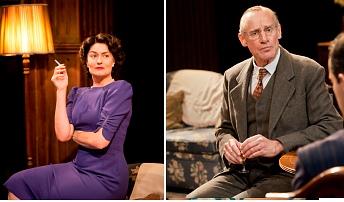South Downs / Browning Version (double bill)
Britain's oddly-termed 'public schools' provide the locations for this pair of short plays. The first is the 'new boy', trying to create an impression to fit with its better known classmate written by Terence Rattigan. Apparently, the estate which controls Rattigan's plays, wanted a new offering to team-up with 'The Browning Version' and that led to the birth of 'South Downs', written by David Hare.
We British seem fascinated by the concept of public - that really means 'private' - schools. Thuggish upperclass bullies beating the living daylights out of innocent young boys, midnight feasts in the dorms, eccentric teachers with flowing gowns have been staple ingredients of novels, films and TV series for the past eternity or two. Though the setting might be over-used, Rattigan's play says more about society as a whole and, is an acknowledged classic especially in terms of the tightly-controlled structure, and well-drawn characterisations.
'South Downs' is a largely humorous play about a boy of 14, John Blakemore, who has few friends, but has a distinctive character and personality. He asks unceasing questions, is worried about the impact of nuclear bombs and wants to wear his 'ban the bomb' badge in school. He is also different because of his class - his father is a sailor and his family can only manage to live in a semi-detached house. To the other pupils he is an oddball and even his only friend in the school, Jenkins, ultimately decides to terminate the friendship as it has become too exhausting for him. But a knight in shining armour - in the form of prefect Jeremy Duffield - comes to Blakemore's rescue.
In Rattigan's 'The Browning Version', first performed in 1948, the focus is not on pupils, but on a teacher, or master as they are known in these organisations. A brilliant scholar of the classics, Andrew Crocker-Harris has spent his life teaching. Now, ill health forces him to take a less demanding post elsewhere, but he is denied a pension by the school governors and the manipulative headmaster wants him to forego his privilege of giving his leaving speech last. Crocker-Harris's wife has been regularly unfaithful and is currently having an affair with another master, Frank Hunter.
Both plays are about 'fitting in', being true to oneself and not caving-in to the pressure of conformity. Though it is very well-acted and directed, the message which 'South Downs' tries to impart isn't sufficiently powerful, and there's quite a dollop of sentimentality in the ending, even if it is warm-hearted. As a curtain-raiser, it is very funny at times and the central character of John Blakemore is exceptionally well-defined by a young actor, Alex Lawther, who shows considerable promise in a carefully-worked and subtle performance that is endearingly convincing - a young actor one should certainly look-out for in the future. He is well-supported by the other young actors playing the other pupils: Jonathan Bailey as prefect Duffield, Bradley Hall as Colin Jenkins, Tom Spink as Tommy Gunter and Liam Morton as Roger Sprule.
In 'The Browning Version', Nicholas Farrell takes the lead as the intensely, but politely severe Andrew Crocker-Harris. Like his counterpart in 'South Downs', Crocker-Harris knows he is regarded as an oddity, but is nonetheless devastated when he learns his nickname: 'the Himmler of the Lower Fifth'. That emotional bullet, coupled with the affection his pupil demonstrates when he gives him a book - the Browning translation of Agamemnon - forces Crocker-Harris to break down. Mr Farrell is straight-laced and punctilious as he should be, but I found his intonation a little grating, even if this is an obviously intentional part of the characterisation. In other respects, Mr Farrell produces a flawless performance that rouses our sympathies. Anna Chancellor provides excellent support as Mrs Crocker-Harris, who cannot find the kind of love she needs from her academically brilliant, but unromantic husband.
There's good contrast between these well-directed plays. 'South Downs' is lighter and more humorous, whereas 'The Browning Version' is intense and heart-wrenching. Both have a sense of hope in that the characters show they can change without betraying their individuality. The public school setting may be over-used, but there is more than enough intellectual meat on this curriculum to make for a rewarding evening.
"[South Downs] is a beautifully melancholic study of the self-dislike many of us experience in our teens...The Browning Version is a surefire play that always touches the heart and Angus Jackson's production boasts another superb performance from Nicholas Farrell. "
Michael Billington for The Guardian
"Rattigan's play is undoubtedly the greater. But Hare emerges with honour... You leave the theatre in no doubt that you have watched a great production of a play [Browning Version] of extraordinary depth, compassion and psychological perception. "
Charles Spencer for the Daily Telegraph
"David Hare has written a new curtain-raiser, South Downs, to accompany Terence Rattigan's fam-ously poignant one-act play, The Browning Version, from 1948. Making an absorbing...double bill"
Kate Bassett for The Independent
External links to full reviews from popular press
The Guardian - Telegraph - Independent -
Originally published on
